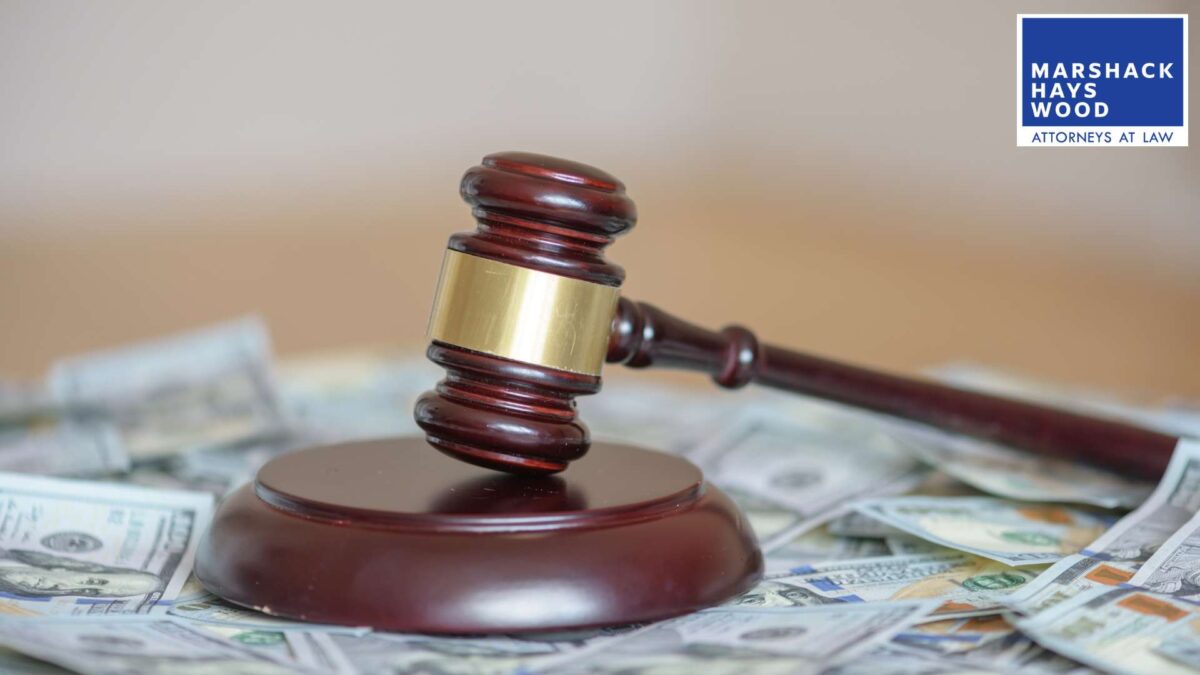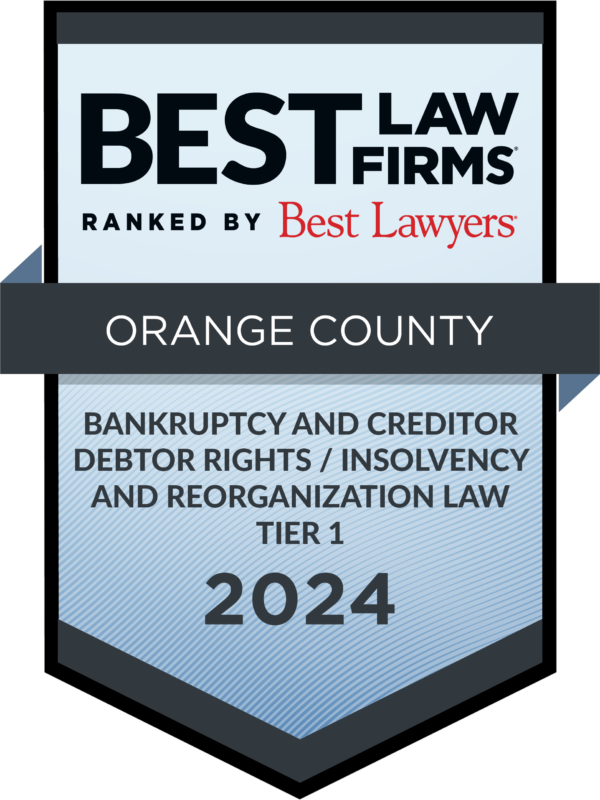Creditor Rights in California
Home » Practice Areas » Creditor Rights in California
Practice Areas
Creditor Rights Attorney in Orange County
There are plenty of resources out there for debtors who don’t understand their rights when it comes to bankruptcy proceedings and debt collection practices. However, creditor claims are the other side of that coin. While a debtor has the right to certain protections, creditors’ rights aim to outline the avenues through which a creditor can collect on a debt. If you are a secured or unsecured creditor in California, the Orange County bankruptcy lawyers at Marshack Hays Wood are here to explain your creditor rights.
To schedule a consultation with one of our business and bankruptcy litigation attorneys, please call our office at 949-333-7777 today.
What Is a Creditor?

A creditor is an individual or financial institution that loans a person money using a loan agreement or contract. Creditors are classified as personal or real. For example, real creditors are banks or other financial institutions with a legal contract or loan agreement with the borrower to grant them the right to seize their real assets if the loan is unpaid. A personal creditor would be a friend, family member, or business that immediately gives an individual or company the supplies or services but allows a delay in payment.
Creditor vs Debtor
Every credit relationship involves a creditor and a debtor. The creditor is the lender of the money, and the debtor is the borrower of that money. When the debtor does not meet the payment obligations that were agreed upon, the debtor is under technical default. When this happens, the creditor can take them to Bankruptcy Court.
Since the creditor maintained their end of the transaction by providing the capital, the debtor has unmet obligations, giving the creditor the right to litigate the matter. Creditors are classified as secured creditors, existing liens on asset collateral, or unsecured creditors not backed by asset collateral.
What Can Creditors Do?

There are several different ways that creditors can try to get their payment from someone. They can sue someone for unpaid debt. When a creditor has entered a judgment with a debtor, the creditor has the right to collect the debt from the debtor’s income, bank accounts, and personal property, otherwise known as garnishments.
The law does protect how much the creditor can garnish from someone’ wages and bank accounts. Certain benefits are omitted from garnishment, like social security and veterans benefits. While there is a statute of limitations on unsecured debts in California, creditors can still seek payment for them; they just can’t sue for them.
Often, debt collection agencies regularly collect debts owed on behalf of the creditors. Debt collectors can pressure someone into paying by calling you frequently, mailing letters, and threatening lawsuits, within reason. The Fair Debt Collection Practices Act (FDCPA) limited this type of contact, however, and has prohibited unreasonable harassment.
Sometimes, debt collectors can sell someone’s debt to another collector. Creditors can also negotiate what someone owes. When dealing with a creditor, it’s always best to have the agreement in writing if they sell the debt or try to negotiate it.
What Can Creditors Not Do?
Creditors are limited by the techniques they use to collect the debt as outlined in the Fair Debt Collection Practices Act (FDCPA). Debt collectors cannot come to your workplace to collect payment. While they can call you at work, they can’t say that they are a debt collector to your coworkers. If you request they stop calling you at work, they must stop by law. Debt collectors also can’t harass you by making repeated phone calls, threatening violence, using abusive and obscene language, or publishing private information about you.
If a debt collector threatens to arrest you for non-payment, know you cannot be charged for unpaid debt. While debt collectors can call you at work, they are limited in when they can contact you. They can only call you after 8 am or before 9 pm. You can also request that they stop calling you at home, but while the phone calls will stop, the debt is still owed.
If a debt collector is after you for a debt that has already been paid or that you don’t owe, this is also illegal. If you’re unsure about the debt, you can check your credit score to see if you still owe money. Debt collectors can’t pretend to work for a government agency. This incident occurred in Georgia in 2014, and the owner and six employees of the agency were arrested for fraud.
The only exception to what creditors cannot do to receive payment is if the money is owed to an in-house credit agency. These debts are relatively new and get turned over to a collection agency after a period of time.
What Are Creditor Rights?

Collections are an essential part of business. When bills are not paid, creditors have various rights available to help ensure that they can recover the amounts owed to them. The attorneys at Marshack Hays Wood are experienced in helping their clients maximize their recovery.
Secured Creditors
Generally, secured creditors have an advantage over unsecured creditors; they have collateral that can be used to satisfy their obligation. A common example of a secured debt is a car loan. Before a secured creditor can recover its collateral, it must file a lawsuit and obtain a judgment on what the debtor owes them.
Therefore, a secured creditor’s provisional remedies focus on ensuring that the value of the collateral is protected during the pendency of litigation.
The most common provisional remedies available to secured creditors include the appointment of a receiver and a preliminary injunction.
- Receiver. Secured lenders can seek the appointment of a receiver, a court-appointed professional who takes control of the secured creditor’s collateral and protects it. Commonly, this provisional remedy is employed when the lender’s collateral is a parcel of income-generating property, and the borrower is engaged in mismanagement. Once appointed, the receiver reports to the court, not the secured creditor.
- Injunction. A secured creditor can obtain an injunction prohibiting the dissipation or destruction of its collateral pending turnover. Although injunctions are difficult to obtain, they are often sought in connection with the appointment of a receiver.
Unsecured Creditors
In litigation, an unsecured creditor’s recovery is more speculative. An unsecured creditor will often use a writ of attachment to obtain a lien against certain of the debtor’s assets, which improves the creditor’s ability to recover when litigation concludes.
- Writ of Attachment. When a debt is contractually based, the creditor can obtain a court order imposing a lien on certain debtor assets. Once the lawsuit concludes, and a judgment is obtained, the lien provides collateral that can be utilized to satisfy the obligation.
- Injunction. In certain situations, a creditor can obtain an injunction prohibiting a debtor from dissipating assets while the creditor takes the necessary steps to obtain a lien against certain assets (writ of attachment).
Creditor Rights in California
California is a creditor-friendly state. If you are in the process of trying to collect a payment, you have a legal claim against the debtor. Creditors have the right to recover the payment borrowed by the debtor and pursue legal action. While the debtor might hire an attorney to try and protect their assets and avoid payment, the creditor can also do so. Since California is creditor-friendly, most lawsuits end in their favor.
Following the judgment, the creditor could receive payment, including all property owned by the debtor and any community property shared with the debtor’s spouse.
Creditor Rights in Bankruptcy

When creditors seek provisional remedies (such as a writ of attachment), debtors occasionally respond by filing a bankruptcy petition. Typically, these petitions result in the debtor receiving a discharge (in general terms, creditors cannot pursue debts that arose before the bankruptcy was filed) and creditors receiving a de minimis amount to satisfy the obligations owed.
Although the Bankruptcy Code gives the debtor certain advantages, it provides creditors complete protection to balance the scales. These protections include the following:
- Motion to Dismiss. Creditors can seek to have a bankruptcy case dismissed. The legal framework governing such a request depends on the chapter under which the bankruptcy petition was filed but can take into account the debtor’s bad faith.
- Discharge litigation (§523). Typically, a debtor can discharge debts through the bankruptcy process. There are, however, circumstances under which a debt cannot be removed. For example, a debt resulting from fraud cannot be discharged as long as the creditor takes steps to have the bankruptcy court declare the debt non-dischargeable.
- Discharge prevention/revocation (§727). Under certain circumstances, a creditor can either prevent the debtor from obtaining a discharge of debt or have the discharge revoked. Some of the most common actions that result in a debtor’s loss of discharge involve failing to disclose (or hide) assets and keeping (or destroying) records that adequately explain the debtor’s financial condition.
- Rule 2004 Exam. When a bankruptcy is filed, the debtor must provide the trustee and creditors with a complete picture of the debtor’s financial condition. Some information is provided in the debtor’s schedules of assets and liabilities. A creditor can obtain additional information or probe the validity of the information provided by utilizing the discovery tools provided in Rule 2004 of the Federal Rule of Bankruptcy Procedure. Although there are some limits to Rule 2004 exams, courts generally consider such exams to be sanctioned “fishing expeditions.”
- Proof of Claim/Objection to Claim. Creditors are entitled to file a proof of claim against the debtor, explaining the amount and basis for the debt owed. When a proof of claim is properly filed, the underlying debt is presumed valid. A proof of claim can be disputed if the challenger presents evidence regarding the debt’s validity. When a proof of claim is challenged, the ultimate burden of persuading the court that a debt is valid is on the claimant.
- Objections to plan. When a debtor uses a plan to reorganize, creditors can object to the plan and argue that certain aspects should be changed. Some of the most common objections relate to the plan’s feasibility (the debtor’s ability to make the proposed payments), the amount offered to creditors (whether the debtor is using its “best efforts”), and whether the debtor is unfairly attempting to retain valuable assets without paying creditors in full (the absolute priority rule).
- Cash collateral disputes. After a bankruptcy case is filed, a debtor cannot use cash or cash equivalents subject to a lien without a court order authorizing the use. To obtain such an order, the debtor must “adequately protect” the creditor against the risk that the value of the collateral will be diminished by the use.
- Lien-priority disputes. When a debtor offers the same property to multiple creditors as collateral, disputes can arise concerning the priority of the creditor’s liens. The senior position is the most valuable.
- Lien-stripping disputes. Under certain circumstances, a debtor can force a creditor to remove a lien from the debtor’s property if the property is over-encumbered (the value of the property is less than the value of the creditor’s lien plus senior liens). If a creditor can show that the property is not “underwater,” the lien cannot be stripped away.
Laws That Outline Creditor Rights

The California Collection laws give a creditor the legal rights and powers to enforce a judgment against a debtor. These laws are outlined in Title 9, “Enforcement of Judgments” of the California Code of Civil Procedure (CCP). This states that all assets the debtor owns can be subject to enforcement, although there are some exceptions. The judgment can include property owned by the debtor and property owned by the debtor’s spouse.
Fair Debt Collection Practices Act (FDCPA)
The Fair Debt Collection Practices Act (FDCPA) is a federal law restricting third-party debt collectors’ actions when collecting debts. The FDCPA outlines how collectors can contact debtors, even breaking down the time of day and the number of times they can initiate contact. If the debt collector violates the FDCPA, the debtor can sue the collection agency and the individual debt collector for damages and legal fees.
Bankruptcy Abuse Prevention and Consumer Protection Act
The Bankruptcy Abuse and Prevention and Consumer Protection Act (BAPCPA) was created in 2005 to revise the United States Bankruptcy Code for cases filed on October 17, 2005, or after. Under the BAPCPA, the requirements for filing Chapter 7 have become more demanding to encourage people to file for Chapter 13 bankruptcy, which is less forgiving. Individuals that file under Chapter 7 will have their unsecured consumer and business debts forgiven or discharged, while those that file under Chapter 13 have to pay back some of their debt before debt discharge is considered.
The BAPCPA also created a bankruptcy means test that establishes if an individual can file for Chapter 7 or Chapter 13 bankruptcy. The Act also raised the waiting period between Chapter 7 filings.
The United States Bankruptcy Code is also known as Title 11 of the United States Code. This title dictates the policies that must be followed when an individual or business files for bankruptcy. When filing for bankruptcy, individuals and businesses can file under Chapter 7, 9, 11, 12, 13, or 15.
- Chapter 7 bankruptcy is the most common type of bankruptcy and involves liquidating assets to cover debts.
- Chapter 9 bankruptcy is reserved only for municipalities helping them restructure their debts.
- Chapters 11, 12, and 13 reorganize the individual’s assets and use them to pay off their debts.
- Chapter 15 involves bankruptcies with foreign courts.
Contact an Orange County Bankruptcy Lawyer
If you’re a creditor trying to recover debts, it’s important to know about the creditor’s rights. The attorneys at Marshack Hays Wood have experience fighting for creditors’ rights before and after a bankruptcy case is filed. We can help you initiate court proceedings to recover what you are owed, as well as sale or loan transactions. We can also aid you in pushing for involuntary bankruptcy proceedings if you worry about the debtor’s ability to pay his or her debts. If you’re involved in bankruptcy litigation with one of your debtors, call the attorneys at Marshack Hays Wood to schedule a free consultation today at 949-333-7777.
READY TO GET STARTED?
At Marshack Hays Wood, our attorneys provide the legal support you need to move forward with confidence. Let us help you take the first step toward financial stability.


